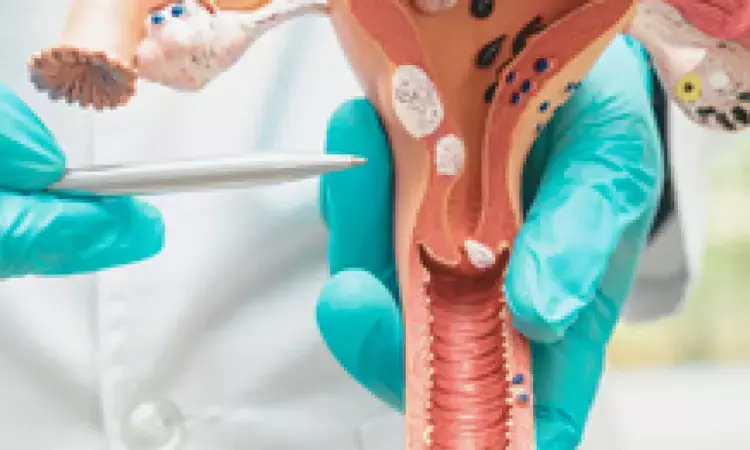- Home
- Medical news & Guidelines
- Anesthesiology
- Cardiology and CTVS
- Critical Care
- Dentistry
- Dermatology
- Diabetes and Endocrinology
- ENT
- Gastroenterology
- Medicine
- Nephrology
- Neurology
- Obstretics-Gynaecology
- Oncology
- Ophthalmology
- Orthopaedics
- Pediatrics-Neonatology
- Psychiatry
- Pulmonology
- Radiology
- Surgery
- Urology
- Laboratory Medicine
- Diet
- Nursing
- Paramedical
- Physiotherapy
- Health news
- Fact Check
- Bone Health Fact Check
- Brain Health Fact Check
- Cancer Related Fact Check
- Child Care Fact Check
- Dental and oral health fact check
- Diabetes and metabolic health fact check
- Diet and Nutrition Fact Check
- Eye and ENT Care Fact Check
- Fitness fact check
- Gut health fact check
- Heart health fact check
- Kidney health fact check
- Medical education fact check
- Men's health fact check
- Respiratory fact check
- Skin and hair care fact check
- Vaccine and Immunization fact check
- Women's health fact check
- AYUSH
- State News
- Andaman and Nicobar Islands
- Andhra Pradesh
- Arunachal Pradesh
- Assam
- Bihar
- Chandigarh
- Chattisgarh
- Dadra and Nagar Haveli
- Daman and Diu
- Delhi
- Goa
- Gujarat
- Haryana
- Himachal Pradesh
- Jammu & Kashmir
- Jharkhand
- Karnataka
- Kerala
- Ladakh
- Lakshadweep
- Madhya Pradesh
- Maharashtra
- Manipur
- Meghalaya
- Mizoram
- Nagaland
- Odisha
- Puducherry
- Punjab
- Rajasthan
- Sikkim
- Tamil Nadu
- Telangana
- Tripura
- Uttar Pradesh
- Uttrakhand
- West Bengal
- Medical Education
- Industry
Expression of genetic marker AFF3 may forecast prognosis and progression of cervical cancer, finds study

Cervical cancer poses a significant global health burden, with over 300,000 annual deaths and ranking as the fourth most prevalent cancer in women. Current screening methods have constraints, underscoring the demand for pioneering treatments. Recent study pinpointed distinct genetic material that exhibited notable variations among cervical cancer patients with diverse survival outcomes, identified in tissue samples collected post-surgery. The study investigated the expression of AFF3 in cervical cancer (CC) tissues and its association with clinicopathological features and prognosis. Tissue samples and clinical data were collected from 78 CC patients who underwent surgery. AFF3 mRNA and protein levels were evaluated in tumor tissues and adjacent normal tissues. The results showed that AFF3 expression was significantly downregulated in CC tissues compared to normal tissues. Low AFF3 expression was associated with lymph node metastasis (LNM) and advanced FIGO stage. Patients with low AFF3 expression had a lower 5-year overall survival (OS) rate of 52.78% compared to 78.57% in the high AFF3 expression group.
Prognostic Factors and AFF3 Expression
Univariate analysis identified AFF3 expression, FIGO stage, LNM, lymphovascular space invasion, depth of myometrial invasion, and histological grade as prognostic factors. Multivariate analysis confirmed low AFF3 expression and histological grade 3 as independent risk factors for poor prognosis in CC patients. Patients with low AFF3 expression had a 2.848-fold higher risk of death compared to those with high AFF3 expression.
Potential Clinical Utility of AFF3
The study provides evidence that decreased AFF3 expression is associated with more aggressive tumor features and poorer survival outcomes in CC. AFF3 could serve as a potential biomarker for prognostic assessment and risk stratification of CC patients. Further research is needed to elucidate the mechanistic role of AFF3 in CC development and progression. Expanding the sample size and investigating the upstream and downstream regulatory pathways of AFF3 will enhance the understanding of its clinical utility in CC management.
Key Points
Here are the 6 key points from the research paper:
1. The study investigated the expression of AFF3 in cervical cancer (CC) tissues and its association with clinicopathological features and prognosis.
2. The results showed that AFF3 expression was significantly downregulated in CC tissues compared to normal tissues. Low AFF3 expression was associated with lymph node metastasis (LNM) and advanced FIGO stage. Patients with low AFF3 expression had a lower 5-year overall survival (OS) rate.
3. Univariate analysis identified AFF3 expression, FIGO stage, LNM, lymphovascular space invasion, depth of myometrial invasion, and histological grade as prognostic factors.
4. Multivariate analysis confirmed low AFF3 expression and histological grade 3 as independent risk factors for poor prognosis in CC patients. Patients with low AFF3 expression had a 2.848-fold higher risk of death compared to those with high AFF3 expression.
5. The study provides evidence that decreased AFF3 expression is associated with more aggressive tumor features and poorer survival outcomes in CC.
6. AFF3 could serve as a potential biomarker for prognostic assessment and risk stratification of CC patients. Further research is needed to elucidate the mechanistic role of AFF3 in CC development and progression.
Reference –
Yaxuan Zhang, Lanying Li, Qingling Han & Lanying Wen (2024) The differential expression of AFF3 in cervical cancer and its correlation with clinicopathological features and prognosis, Journal of Obstetrics and Gynaecology, 44:1, 2333784, DOI: 10.1080/01443615.2024.2333784
MBBS, MD (Anaesthesiology), FNB (Cardiac Anaesthesiology)
Dr Monish Raut is a practicing Cardiac Anesthesiologist. He completed his MBBS at Government Medical College, Nagpur, and pursued his MD in Anesthesiology at BJ Medical College, Pune. Further specializing in Cardiac Anesthesiology, Dr Raut earned his FNB in Cardiac Anesthesiology from Sir Ganga Ram Hospital, Delhi.
Dr Kamal Kant Kohli-MBBS, DTCD- a chest specialist with more than 30 years of practice and a flair for writing clinical articles, Dr Kamal Kant Kohli joined Medical Dialogues as a Chief Editor of Medical News. Besides writing articles, as an editor, he proofreads and verifies all the medical content published on Medical Dialogues including those coming from journals, studies,medical conferences,guidelines etc. Email: drkohli@medicaldialogues.in. Contact no. 011-43720751


